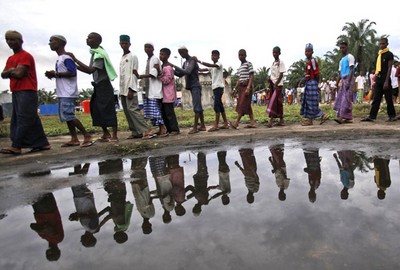Myanmar’s civil war and the Rohingya tragedy
Burma was suddenly cut free from the British Empire following World War II. The significant minorities in Myanmar were under the generally highly oppr
Dec 02, 2017

By Michael Kelly SJ, Bangkok, Michael Sainsbury, John Zaw and Rock Ronald Rozario
Burma was suddenly cut free from the British Empire following World War II. The significant minorities in Myanmar were under the generally highly oppressive military rule in various guises from 1962 to 2015 — despite elections being held in 2010 — reducing the once prosperous country and the rice bowl of Southeast Asia to one of the least developed nations in the world in just 60 years.
For decades, the country has been in a state of usually multi fronted, permanent civil war. More than half a dozen significant conflicts and myriad other smaller, deadly disputes and conflict zones stand out.
Myanmar’s east, now in ceasefire for almost a decade, has seen about 120,000 refugees living in camps across the border in Thailand, some for decades, the majority from Christian Karen and Kayah states. The civil war in Kachin is occurring in a majority Christian state whose population are Baptist, Assemblies of God and Catholic, in order of popularity. Their kinsmen in neighboring Shan state revived a war in 2011 after 17 years of an uneasy ceasefire.
About 120,000 people from the region now live in dozens of internally displaced persons camps.
The world has become so inured to the tragedies of Myanmar with their forgotten refugees and deadly civil wars. Countless thousands of people have been killed in the past 70 years, and the multi-generational tragedies, many among majority Christian ethnic groups such as the Chin, Kachin, Karen and Karenni, have received only spasmodic attention from the global media.
For almost 50 years from 1962, these conflicts took place behind the opaque walls of a cruel regime that ran one of most isolated nations on earth. The Church, however, has been vigilant in Thailand, on the Myanmar border and the Jesuit Refugee Service active in two camps that house approximately 12,000 people.
More recently, as the country has opened up, the Myanmar branch of Caritas, known as Karuna, has been heavily involved in caring for internally displaced people in the camps in Kachin and northern Shan state.
Despite the horrors that Myanmar’s military has inflicted upon the country for six decades, even they have managed to surpass their worst excess in the past five years, the last two under the nominal civilian government led by the apparently hapless Aung San Suu Kyi.
The final push in a five-year concerted campaign begun in 2012 is the military led, sectarian determination to drive out (and into Bangladesh) about 1.1 million ethnic Muslims. They self-identify as Rohingya but are described by Myanmar’s government as Bengalis or Rakhine Muslims who live in northern Rakhine state adjacent to Bangladesh.
The group has a complex history in the region that dates to the Arakan Kingdom that covered western Myanmar and southeast Bangladesh and whose numbers inside Myanmar grew during the British colonial period.
The Rohingya ethnicity is not officially recognised by the Myanmar government as one of its 135 official ethnic groups.
About 120,000 have already been trapped in camps in their own state since the beginning of the latest round of military backed violence in 2012. Most remain stateless and without identity cards. They were cut adrift by a repressive 1982 Citizenship law imposed by the junta, which the civilian government seems unable, or perhaps even unwilling, to change for fear of the political damage it would do to them.
Since Aug 25, when the military launched its latest campaign in response to a localised terrorist attack, the world has watched in horror as at least 500,000 Rohingya joined the 300,000 already in Bangladesh refugee camps in what the UN High Commissioner for Refugees has called a textbook case of ethnic cleansing. In forcing roughly half the Rohingya population from their homes, it is hard to call it anything else.
At the same time, the world has been bewildered, then dismayed, as arguably the most internationally (and domestically) beloved Nobel Peace Prize Laureate since Nelson Mandela, has remained all but silent. When she has opened her mouth, it was only to put her foot in it by introducing red herrings such as the complicity of NGOs in the insurgence, a refusal to point the finger at the military perpetrators, and for displaying a disturbing lack of compassion.
She remains unable, for largely political reasons, to utter the word Rohingya or even to make comments about the fate of the latest victims of one of the world’s most murderous militaries.
Myanmar’s military also controls the police force and the border force. It likewise holds 25 percent of the seats in all Myanmar’s federal and state parliaments, unelected.
Few have bothered to dig into the deeply complex political minefield that is modern Myanmar, where Suu Kyi and her National League for Democracy, despite winning the country’s 2015 poll in a landslide with almost 80 percent of the vote, are very much the junior, powerless partners in an invidious power sharing arrangement.--ucanews.com --(Used with permission)







Total Comments:0